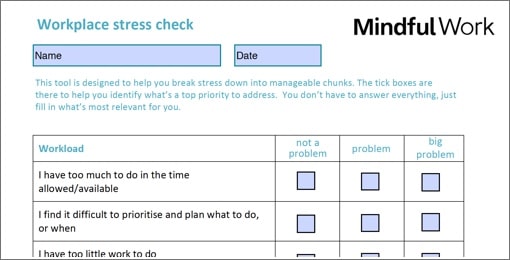The Stress Check tool
Stress is sometimes just a feeling of being overwhelmed. It can be difficult to understand all the factors that have caused it.
This tool aims to help you or your colleagues to break stress down into its component parts. That way you can develop a strategy to deal with it.
When you register we'll add you to our mailing list for tips about managing stress. Privacy assured.
Stress in the workplace, its common causes, and how mindfulness helps
We all need a level of challenge to be at our most productive. However, when our capacity to absorb stress reaches its limit, we start to suffer, and so does our work. Hence the parabolic curve below:

As this diagram suggests, when there's too much stress it can lead to ill-health and breakdown. However, by building resilience to stress factors, and learning to focus better, you can do more, and stay well. This is one of the proven outcomes from mindfulness training.
The most common cause of stress at work is over-demand - having too much to do, never getting on top of it, and the pressure of unreasonable expectations. This is exacerbated by our always-on, mobile media environment. In our workplace training we explore ways to become more efficient and communicate and agree reasonable limits with colleagues and clients.
Another top cause is conflict - with co-workers, managers, and clients. The key to dealing with this is mindful communication, compassion for self and others, and clarity of values and motivation ie seeing the bigger picture. Mindfulness in this case must be underpinned by solid values and selfless behaviour.
The third most common factor is adapting to change and feeling out of control of circumstances. When stress takes over, the fight or flight reaction actually inhibits the frontal cortex so stops us thinking logically. Mindfulness helps us step back from immediate worries, maintain a stable inner sense of calm and control, and allows our rational brain to seek solutions to challenges in tune with our values.
What's needed - personal resilience or better management?
Both. The culture of an organisation, and the skills and approach of its leaders, are critical factors. Managed well, stress for individual employees can be minimised.
However, we live in challenging times. Stress, with the best management possible, is a growing factor. So personal resilience works in tune with good management.
Our approach is to help organisations at a leadership level, whilst also equipping everyone to manage stress better for themselves, and cope with an ever-more demanding environment.
